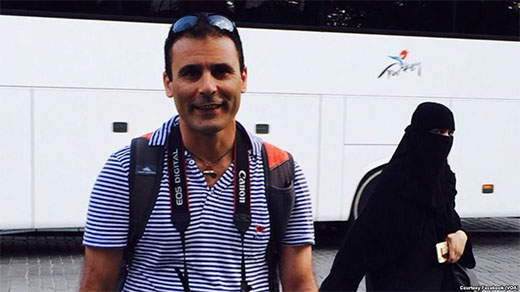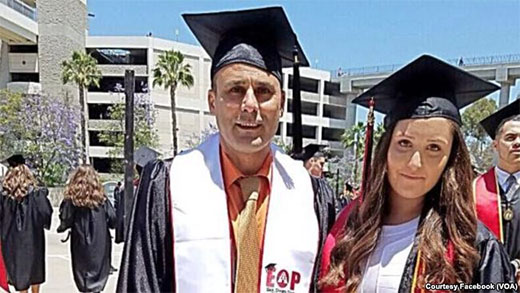
Reza “Robin” Shahini, who was born in Iran and emigrated to the U.S., was detained in July 2016 in Gorgan, Iran, where he traveled to visit his mother and other family members.
WASHINGTON-VOA-March 02, 2017- The sister of an Iranian-American man detained in Iran since July says he has entered the third week of a hunger strike against what he sees as an unjust jail term for “collaborating with a hostile government.”
Speaking to VOA Persian by phone from her home in San Diego, California, on Thursday, Fateme Shahini said she has learned that her brother Reza “Robin” Shahini, who is in his late 40s, has become weak and accepted intravenous blood transfusions.
Fateme Shahini said she learned of her brother’s condition from her mother and sister, whom she said had visited him Wednesday at the prison where he is being detained in the northern city of Gorgan.
Fateme Shahini said her mother and sister pleaded with Robin Shahini to end the hunger strike that he began February 15, but he refused. She also said it was the first time they were allowed to see him in three weeks.
Sentenced to 18 years
Robin Shahini called several U.S. news outlets from prison last October and told them that an Iranian court had sentenced him to 18 years in prison that month. He said authorities had detained him in Gorgan in July 2016, after he had traveled there from his U.S. home in San Diego to visit his mother and other family members.

Resa “Robin” Shahini graduated from San Diego State University in May 2016 with a bachelor’s degree in international conflict resolution and planned to pursue a graduate degree. He was arrested in July 2016 in Iran, where he traveled to visit relatives, and sentenced to 18 years in prison.
Robin Shahini, who was born in Iran and emigrated to the U.S. in 2000, graduated from San Diego State University in May 2016 with a bachelor’s degree in international conflict resolution. He had planned to pursue a graduate degree in homeland security studies at the same university later in 2016.
After Shahini’s arrest, the intelligence unit of Iran’s Islamic Revolutionary Guard Corps said a dual national detained in July, whom it did not name, had been charged with crimes including “collaborating with a hostile government, acting against national security and communicating with anti-revolutionary agents and media.”
A news outlet founded by Iranian state broadcaster IRIB, the Young Journalists Club, said it appeared that Robin Shahini was the subject of those charges.
Robin Shahini confirmed the charge of “collaborating with a hostile government” in an October 25, 2016, phone interview with the Los Angeles Times, and said prosecutors had used his social media posts as evidence against him. He also gave an interview to a VOA Persian television program in 2010.
Cut off from family, lawyer
Fateme Shahini said her brother has been out of phone contact since mid-February. She also said a Tehran-based lawyer whom her family hired to represent Robin has been unable to see the charges against her brother despite traveling several times to a court processing his case in the northern city of Qom.
In a statement to VOA Persian February 24, the U.S. State Department responded to questions about Robin Shahini by saying it would not provide details of U.S. efforts in specific consular cases for privacy reasons.
It added: “The safety and security of U.S. citizens remains a top priority. We continue to use all the means at our disposal to advocate for U.S. citizens who need our assistance overseas, especially for the release of any unjustly detained U.S. citizens held overseas.”
The State Department had issued an almost identical statement to U.S. news outlet VICE for a story about Robin Shahini last October, when the department was under the administration of former President Barack Obama.
The latest statement issued since the Trump administration took office in January added the words about “especially” seeking the release of Americans “unjustly detained” overseas.
U.S.-based rights group International Campaign for Human Rights in Iran told VOA Persian that Robin Shahini’s imprisonment is part of a series of Iranian detentions of dual nationals who visit the country.
The group’s executive director, Hadi Ghaemi, cited the case of Iranian-British woman Nazanin Zaghari-Ratcliffe, detained in Iran on unspecified security charges since April 2016.
“It seems that the main reason for these detentions is to take Iranian dual nationals hostage and demand money from their other countries of citizenship in exchange for their release,” Ghaemi said.
Zaghari-Ratcliffe’s British husband, Richard Ratcliffe, has said he believes his wife also has been used as a bargaining chip by Tehran in its disputes with the West.
VOA Persian Service journalists Afshar Sigarchi, Guita Aryan, Tomaj Javidtash and Mohammad Manzarpour contributed to this report.
